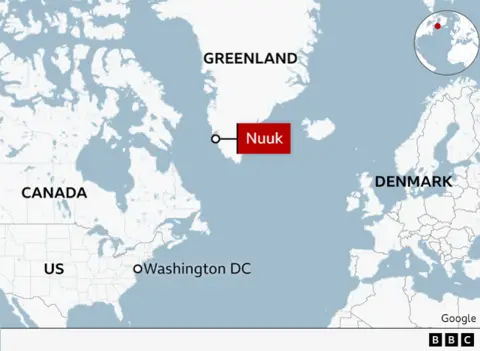 Getty Images
Getty ImagesCopenhagen's gloomy January weather matches the mood of Denmark's politicians and business leaders.
“We take this situation very, very seriously,” Foreign Minister Lars Lokke Rasmussen said of Donald Trump's threat to annex Greenland and punish Denmark with higher tariffs if it balks.
But, he added, the government has “no ambition to escalate some war of words.”
Prime Minister Mette Frederiksen rejected Trump's own suggestion that the United States could use military force to seize Greenland. “I don't have the imagination to imagine that it will ever reach,” he told Danish TV.
And Danish industry CEO Lars Sandal Sørensen also said, “There's every reason to be calm… nobody has any interest in a trade war.”
But behind the scenes, hastily organized high-level meetings have been taking place throughout the week in Copenhagen, reflecting the shock caused by Trump's comments.
Greenland Prime Minister Mute Egede flew to meet both the Prime Minister and King Frederik X on Wednesday.
And on Thursday night, party leaders from across the political spectrum gathered in Denmark's parliament for an extraordinary meeting on the crisis with Mette Frederiksen.
Faced with what many in Denmark are calling Trump's “provocations,” Fredriksen has largely tried to strike a conciliatory tone, repeatedly referring to the United States as “Denmark's closest partner.”
 AFP
AFPHe added that the US preoccupation with the Arctic and Greenland was “only natural”.
Yet he also said that any decision about Greenland's future should rest solely with its people: “Greenland belongs to the Greenlanders… and it is the Greenlanders who must define their future.”
His cautious approach is twofold.
On the one hand, Frederiksen is keen to avoid escalating the situation. Earlier in 2019, Trump came under fire when he canceled a visit to Denmark after he said his offer to buy Greenland was “absurd.”
“Then he had another year in office, then everything went back to normal,” veteran political journalist Eric Holstein told the BBC. “But maybe this is the new normal.”
But Frederiksen's comments also speak to the Danes' determination not to interfere in the internal affairs of Greenland – an autonomous region with its own parliament and whose population is increasingly leaning towards independence.
“He should have been more clear in rejecting the idea,” said opposition MP Rasmus Jarlov.
He told the BBC that “this level of disrespect from a very loyal ally and friend from the next US president is record-setting,” although he acknowledged that Trump's use of force “surprised everyone.”
The Conservative MP believed that Fredriksen's insistence that “only Greenland… can determine and define the future of Greenland” put too much pressure on the island's inhabitants. “It would have been prudent and prudent to stand behind Greenland and say clearly that Denmark does not want to [a US takeover]”
 AFP
AFPThe Greenland question is a delicate one for Denmark, whose prime minister has formally apologized for leading a 1950s social experiment that saw Inuit children removed from their families and re-educated as “model Danes”.
Last week, Greenland's leader said the region should be freed “from the shackles of colonialism”.
In doing so he exploited the growing nationalist sentiment, fueled by interest among Greenland's younger generation in the indigenous culture and history of the Inuit.
Most commentators now expect a successful independence referendum in the near future. While this will be seen as a victory by many, it could also usher in a new set of problems, as 60% of Greenland's economy is dependent on Denmark.
An independent Greenland “has to be chosen,” says Kirsten Honz. The Social Democrat MP now fears his preferred option of a new Commonwealth-style deal “based on equality and democracy” is unlikely to materialise.

Sitting in his parliamentary office decorated with poems and drawings depicting scenes of Inuit life, Hong said Greenland must decide “how much it values freedom”. It could cut ties with Denmark and return to the U.S., Hong said, “but if you value freedom, that doesn't make sense.”
Opposition MP Jarlov argues that there is no point in forcing Greenland to become part of Denmark, “it is already very close to being an independent country”.
Its capital, Nuuk, is self-governing, but depends on Copenhagen for currency, foreign relations and defense – as well as managing substantial subsidies.
“Greenland today has much more independence from the EU than Denmark does,” Jarlov added. “So I hope they think things through.”
As Mette Frederiksen has the awkward task of responding firmly without offending Greenland or the United States, the harshest rejection of Trump's comments came from outside Denmark.
The principle of border violations “applies to every country… whether it's a very small or a very powerful one,” German Chancellor Olaf Scholz warned, while French Foreign Minister Jean-Noël Barrot said the EU would not allow it. Other countries “invaded its sovereign borders”.
Their comments allayed deep concerns within the EU about how to handle the impending Trump presidency. “This is not only very serious for Greenland and Denmark – it is serious for the whole world and the whole of Europe,” said MP Kirsten Høng.
“Imagine a world – which we may face in just a few weeks – where international agreements do not exist. It will shake everything up, and Denmark will be a small part of it.”
Denmark's business sector was similarly deeply nervous after Trump said he would “tariff Denmark at very high levels” if it refused to cede Greenland to the United States.
A 2024 Danish industry survey showed that Denmark's GDP would fall by three points if the US imposed a 10% tariff on imports from the European Union to the US as part of a global trade war.
It would be nearly impossible for the US to isolate Danish products from the influx of EU products and would almost certainly result in retaliatory measures from the EU. But trade industry professionals are taking little chances, and elsewhere on the continent, such as in Denmark, vast resources are being spent internally on planning the possible outcome of Donald Trump's second term in the White House.
As her debut approaches, the Danes are preparing as best they can to weather the storm. It is hoped that the president-elect can soon focus on complaints against other EU partners and that the Greenland question can be temporarily shelved.
But uneasiness remains over Trump's refusal to rule out military intervention in the occupation of Greenland.
Kirsten Hong said, “Whatever decision the US takes, Denmark will suffer.”
“All they have to do is send a small warship to cruise the coast of Greenland and send a polite letter to Denmark,” he said, only partly joking.
“The last sentence will be: Well, Denmark, what are you going to do about it?
“This is the new reality with Trump.”
